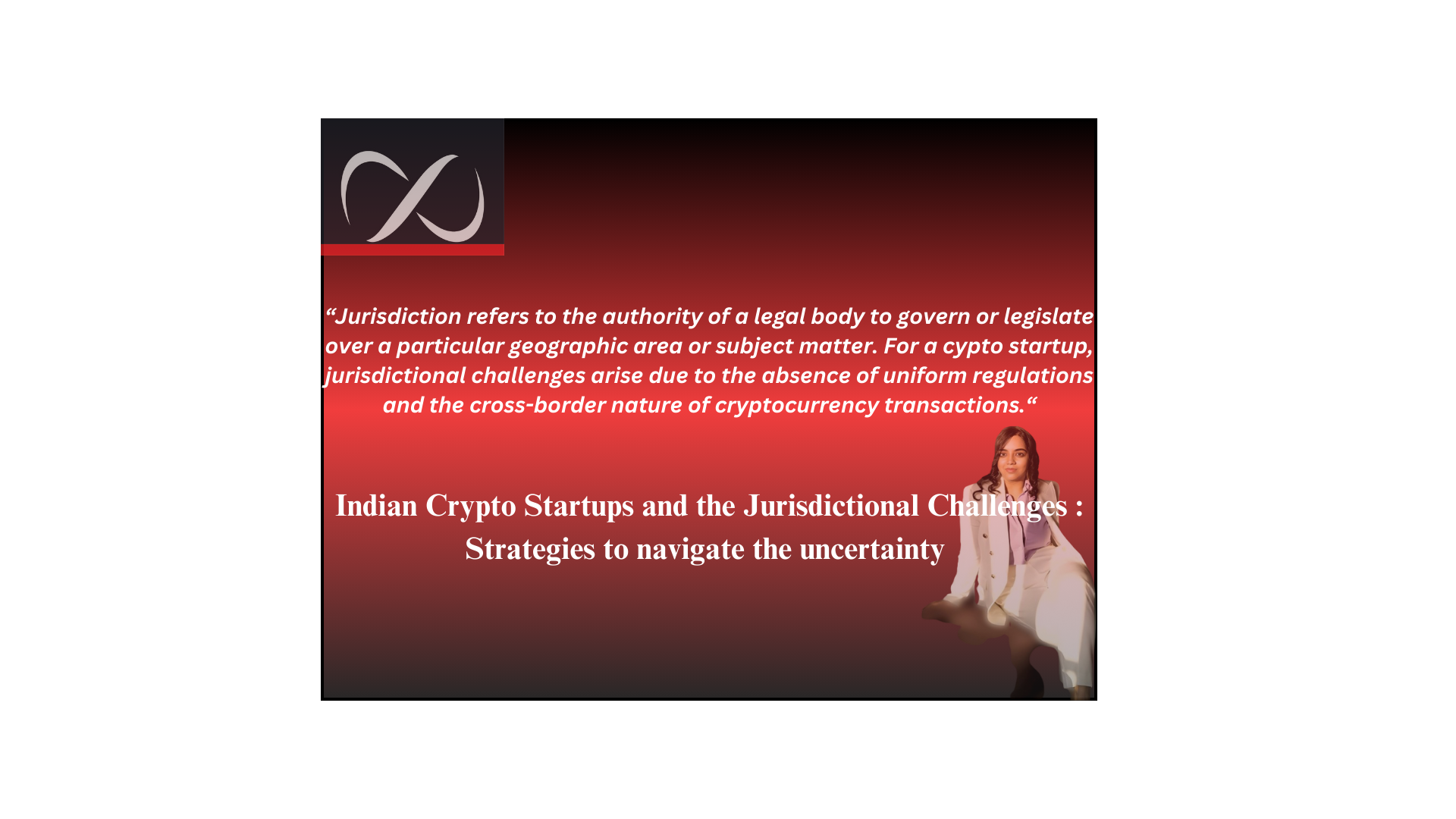
Introduction
The rise of cryptocurrencies and blockchain technology has revolutionized the financial landscape, introducing new opportunities for innovation and growth. In India, crypto start-ups like the start-up are at the forefront of this revolution, offering novel solutions and services in the digital asset space. However, the decentralized nature of cryptocurrencies and the varied legal landscape across different jurisdictions pose significant challenges. This article delves into the jurisdictional issues faced by the start-up and provides insights on how to navigate these complexities effectively.
Understanding Jurisdictional Challenges
Jurisdiction refers to the authority of a legal body to govern or legislate over a particular geographic area or subject matter. For a crypto start-up like the start-up, jurisdictional challenges arise due to the absence of uniform regulations and the cross-border nature of cryptocurrency transactions.
Key Issues:
- Varying Legal Frameworks: Different states and countries have diverse legal principles governing contracts and rightful titles. What constitutes a valid contract in one jurisdiction might be void in another. This disparity can create significant legal hurdles, especially for start-ups that operate internationally or cater to a global customer base.
- Unclear Regulatory Environment: In India, the regulatory stance on cryptocurrencies remains ambiguous, adding to the complexity of determining the applicable legal framework. This ambiguity can lead to operational uncertainties and hinder strategic planning, as regulatory compliance becomes a moving target.
- Dispute Resolution: The lack of a standardized dispute resolution mechanism for cross-border crypto transactions can lead to legal uncertainties and operational disruptions. Without clear guidelines, resolving disputes can become time-consuming and costly, impacting business continuity and stakeholder trust.
Governing Law and Contract Validity
Forsuch start-ups, determining the governing law for its transactions is crucial. The governing law affects the validity of contracts, the enforcement of rights, and the resolution of disputes.
Challenges:
- Contractual Validity: The legal principles that define a valid contract vary significantly. For instance, a smart contract executed on a blockchain may be considered valid in a jurisdiction that recognizes digital signatures, while it might be void in another that requires traditional paper-based contracts. This discrepancy can result in enforceability issues and legal conflicts.
- Rightful Title: Determining rightful ownership of digital assets can be contentious. Different jurisdictions have varying rules on property rights and ownership, complicating the resolution of disputes over digital assets. This is particularly problematic for crypto assets, where ownership can be transferred across borders in a matter of seconds.
Internal Governance System
To mitigate jurisdictional challenges, the start-up must establish a robust internal governance system that predetermines the governing law for its transactions and specifies the mode of dispute resolution.
Components of an Effective Governance System:
- Pre-determined Governing Law:
- Uniform Contracts: the start-up should develop standardized contracts that specify the governing law. This can help ensure consistency and predictability in legal outcomes. Such contracts should be reviewed regularly to accommodate any changes in the legal landscape.
- Jurisdiction Selection: Selecting a favorable jurisdiction with clear and supportive crypto regulations for governing transactions can provide a stable legal framework. Popular choices include jurisdictions like Singapore, Switzerland, or Estonia, known for their progressive crypto laws. By choosing these jurisdictions, XYZ can benefit from more predictable legal environments and potentially favorable legal precedents.
- Dispute Resolution Mechanism:
- Arbitration Clauses: Including arbitration clauses in contracts can offer a flexible and efficient mode of dispute resolution. Arbitration is generally faster and more confidential than court litigation and can be tailored to the needs of the crypto industry. By selecting experienced arbitrators who understand the intricacies of blockchain technology, the start-up can ensure more informed and relevant judgments.
- Mediation and Conciliation: These methods can provide amicable solutions to disputes without the need for adversarial proceedings, preserving business relationships and reducing legal costs. Mediation, in particular, can be a less formal and more collaborative way to resolve disputes, helping maintain positive business relations.
Addressing Cross-Border Transactions
Cross-border transactions are integral to the operations of a crypto start-up like the start-up. However, navigating the regulatory differences across countries requires strategic planning and legal expertise.
Strategies to Manage Cross-Border Challenges:
- Regulatory Compliance:
- Multi-Jurisdictional Compliance: the start-up should ensure compliance with the regulations of all jurisdictions involved in its transactions. This may involve maintaining a compliance team with expertise in international law. Regular audits and compliance checks can help identify and mitigate potential legal risks before they become significant issues.
- Regulatory Arbitrage: Selecting jurisdictions with favorable regulations for certain operations can minimize legal risks and enhance operational efficiency. This strategy involves taking advantage of differing regulations between jurisdictions to optimize business operations and reduce compliance burdens.
- Legal Structuring:
- Subsidiaries and Affiliates: Establishing subsidiaries or affiliates in different jurisdictions can help manage regulatory compliance and operational risks. Each entity can adhere to the local laws while maintaining overall strategic coherence. This approach can also facilitate easier access to local markets and resources.
- Partnerships and Alliances: Forming strategic partnerships with local entities can facilitate smoother operations and regulatory compliance in foreign jurisdictions. These partnerships can provide valuable local insights and help navigate complex regulatory environments more effectively.
Dispute Resolution and Enforcement
Effective dispute resolution and enforcement mechanisms are critical for maintaining operational stability and trust among stakeholders.
Best Practices for Dispute Resolution:
- Contractual Clarity:
- Clear Terms and Conditions: Ensuring that contracts are drafted with clear terms and conditions can reduce ambiguities and potential disputes. Contracts should explicitly define the rights, obligations, and remedies of all parties involved. This clarity helps prevent misunderstandings and sets clear expectations for all parties.
- Choice of Law and Forum Clauses: Including choice of law and forum selection clauses in contracts can help pre-determine the applicable legal framework and venue for dispute resolution. These clauses can provide certainty and reduce jurisdictional conflicts, making it easier to manage legal issues when they arise.
- Alternative Dispute Resolution (ADR):
- Arbitration: Utilizing arbitration can provide a neutral and efficient forum for resolving disputes. Selecting arbitral institutions with expertise in crypto and blockchain technology can enhance the quality of dispute resolution. Arbitration can be tailored to the specific needs of the parties, offering a more flexible and confidential resolution process.
- Online Dispute Resolution (ODR): For digital transactions, ODR platforms can offer a convenient and efficient means of resolving disputes without the need for physical presence. ODR can be particularly effective for resolving small-scale disputes quickly and cost-effectively.
Building Trust and Transparency
In addition to legal and operational measures, building trust and transparency with stakeholders is essential for navigating jurisdictional challenges.
Steps to Enhance Trust and Transparency:
- Transparency in Operations:
- Regular Disclosures: Providing regular updates and disclosures about business operations, compliance efforts, and regulatory developments can build trust among stakeholders. Transparency demonstrates a commitment to accountability and ethical business practices.
- Clear Communication: Maintaining open lines of communication with customers, investors, and regulators can foster transparency and mitigate concerns related to jurisdictional uncertainties. Effective communication helps build strong relationships and enhances stakeholder confidence.
- Stakeholder Engagement:
- Community Involvement: Engaging with the crypto community through forums, social media, and events can enhance credibility and support for the start-up’s operations. Active participation in the community helps build a positive reputation and can attract loyal customers and partners.
- Regulatory Dialogue: Proactively engaging with regulators and participating in policy discussions can help shape favorable regulatory frameworks and demonstrate the start-up’s commitment to compliance. Building relationships with regulators can lead to more constructive and supportive regulatory environments.
Conclusion
Navigating jurisdictional challenges is a complex but essential aspect of operating a crypto start-up like the start-up in India. By establishing a robust internal governance system, ensuring multi-jurisdictional compliance, adopting effective dispute resolution mechanisms, and fostering trust and transparency, the start-up can mitigate legal uncertainties and enhance its operational resilience. As the regulatory landscape evolves, proactive engagement with stakeholders and continuous adaptation to legal developments will be key to the start-up’s success in the dynamic world of cryptocurrencies. Embracing these strategies will not only help the start-up navigate current challenges but also position it for long-term growth and stability in the rapidly evolving crypto ecosystem.











